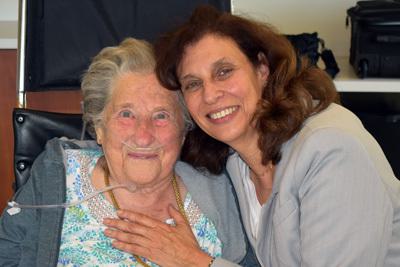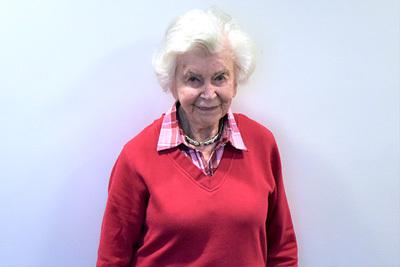Los Angeles Jewish Health Residents Share Stories From the Shoah


Los Angeles Jewish Health Residents Share Stories From the Shoah

With each passing year, the number of survivors of the Holocaust continues to dwindle. At Los Angeles Jewish Health (LAJH), we are privileged to care for some of these exceptional individuals, and we are dedicated to helping them preserve their incredible stories of triumph and resilience.
This year, Los Angeles Jewish Health teamed up with the Providence Institute for Human Caring (a nonprofit organization affiliated with Providence, one of the nation's largest health systems) to document the histories of survivors who reside at Los Angeles Jewish Health. In total, 11 residents ranging from 79 to 98 years-old shared their stories; the interviews yielded both video and audio recordings.
"It was a humbling experience—and a true honor—to capture these narratives," says Scott Acord, the Providence Institute's communications and external affairs manager. "These folks and their families had their lives and livelihoods stolen from them simply because they were Jewish. Yet, somehow, they persevered. They possess an inner strength I'm not sure I'll ever have."
The interviews were conducted as part of Hear Me Now, an initiative founded by the Providence Institute for the purpose of recording personal histories as a way to make healthcare more humane. For many years, Hear Me Now partnered with StoryCorps, a project that gained national prominence when it became a regular feature on National Public Radio. As with StoryCorps, recordings from Hear Me Now are archived at the Library of Congress.

"Sharing stories, and learning about those in our community, is one important way of building a society that prioritizes personalized care," Scott says. "The interviews with Holocaust survivors fall under our ‘faith-based and cultural traditions' category. Providence is a Catholic-based organization, and it's important to us to forge connections with members of other faith communities."
Those connections are what enabled the Los Angeles Jewish Health-Providence Institute
collaboration in the first place. Prior to assuming the role of CEO and president for Los Angeles Jewish Health,
Dale Surowitz had a long and successful career with Providence, most recently as
CEO of Providence Cedars-Sinai Tarzana Medical Center. Dale's relationship with
his peers at Providence was the initial impetus for the two nonprofits (Los Angeles Jewish Health and
the Providence Institute) to team up through Hear Me Now.
Leading the
interviews were Los Angeles Jewish Health's own Annette Weinberg, lifestyle and
enrichment director, Katie Abelson, director of social services, and Susan Leitch,
safety officer and community manager. The interviews lasted between 15 and 60 minutes
each. Edited versions of the conversations will be available online at
hearmenowstories.org;
the full interviews will be accessible on the
StoryCorps website.
"We were blessed to record these stories and to be witness to these first-person accounts of such a pivotal moment in history," Scott says. "Going forward, they'll be a vital resource for future generations."
You may listen to Carolyn Weingarten's story "Fleeing to Palestine" by clicking here. Be sure to check back over the summer on the Los Angeles Jewish Health Website - lajhealth.org. We’ll be posting additional stories as they are shared with us.